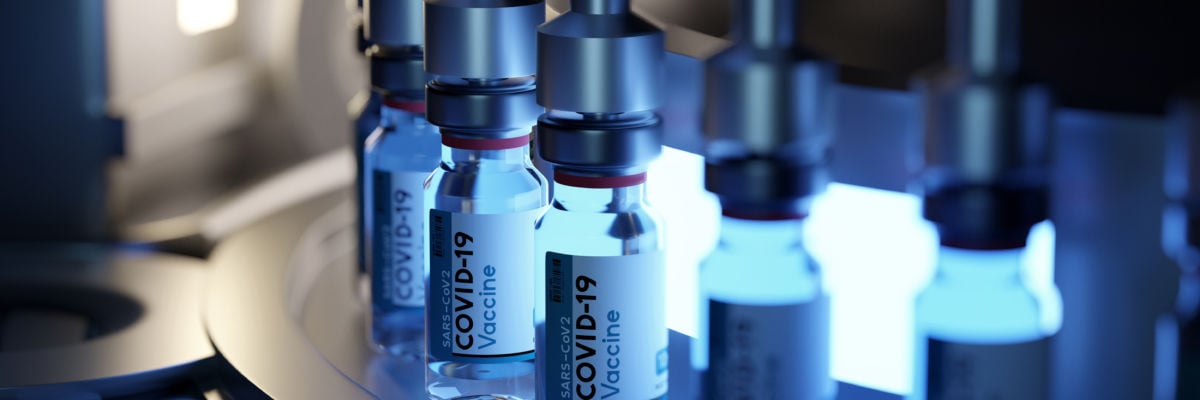
What should Catholics do about the ethics of COVID-19 vaccines?
As vaccine mandates pop up in the United States and around the world, some Catholics continue to object to receiving them because of their connection to abortion.
One criticism of individuals who refuse to comply with COVID-19 vaccine mandates because of the use of cell lines derived from aborted babies—most notably the HEK-293 cell line, reproduced over time from a culture allegedly from an abortion that took place in a Dutch research lab in the 1970s—is that many other common medicines and products have been tested with HEK cell lines. One hospital in Arkansas required staff members who were seeking an exemption from vaccine mandates to attest that they also do not use other products that have been developed or tested on HEK-293 cell lines. A local news article says:
On the hospital’s form is a list of many typical medications. including aspirin, many antacids and numerous cold & flu medications, that were developed or tested using fetal cell lines . . . “We feel that if you request an exemption then attesting to that form really should follow,” he explained, adding that he feels many who seek this exemption are using the religious exemption as a way to hide behind being hesitant.
The critics of conscientious Catholics who seek an exemption from vaccine mandates are basically saying: “If you’re really against taking COVID-19 vaccines because they were tested on HEK cell lines, then you should also be against taking any other product that has been tested in a similar way like aspirin or Tylenol. If you don’t do that, then your objection to being vaccinated against COVID-19 seems rooted another reason (like concern about vaccine safety), rather than a sincerely held moral or religious belief.”
In response, defenders of the religiously based vaccine exemptions have said there is a morally relevant distinction between the HEK testing that was done on other commonly used products and what was done on COVID-19 vaccines. Consider aspirin, which Bayer patented in 1899 and was derived from salicylic acid in the bark of willow of trees. The argument says that even if aspirin was tested with HEK-293 cell lines decades after it was patented, those unethical experiments had nothing to do with aspirin coming becoming commercially available to the general public. COVID-19 vaccines, however, were immediately tested on HEK cells before they could be given to the public.
Though it isn’t explicitly stated in most of the critics’ writings, their argument seems to hinge on this distinction: it is wrong to use a drug whose commercial existence depends on HEK cell testing. Aspirin presumably would still be on the shelves for headache treatment even if no HEK cell tests were done on it. COVID-19 vaccines, however, would not be commercially available if it had not been for HEK cell tests. So, the critic says, because the HEK-293 testing on COVID-19 vaccines was essential to their being commercially available, those vaccines are “morally tainted.”
On the one hand, this distinction has some merit. Imagine that a researcher tries to discover if Drug X can be used for a new purpose Y. The researcher takes part in an unethical experiment using Drug X and discovers that Drug X cannot be used for new purpose Y. Well, it would not be immoral to use Drug X for its original purpose even though an unethical scientist tried to see if the drug could be used for a different purpose. If this is essentially what happened with HEK cell testing involving drugs like Tylenol and aspirin, then there does seem to be a relevant difference between those products and many COVID-19 vaccines.
On the other hand, let’s return to the assumption that seems to lie under these arguments: it is wrong to use a drug whose commercial existence depends on HEK cell testing. The problem with this distinction is that a drug’s commercial existence depends on more than just testing done during its development. It could depend on HEK cell testing that proves that the drug is still safe and effective. HEK cells have been used to investigate the mechanisms involved in Tylenol’s potential to cause liver cell death. It could also depend on HEK cell testing that updates dosage requirements or shows that a previously approved drug can be safely used for a new purpose (like treating COVID-19). For example, recent research with HEK cells has shown that aspirin and ivermectin could be used in future anti-cancer treatments.
So what lessons can we draw from this controversy?
First, the Congregation for the Doctrine of the Faith has made it clear that Catholics do not sin if they receive the Covid-19 vaccine, nor do they sin if they conscientiously refuse to get vaccinated—though they, like all of us, should still take appropriate steps to not infect vulnerable people to dangerous diseases.
Second, those who conscientiously refuse to be vaccinated against COVID-19 are not necessarily inconsistent if their objection is based on using products whose commercial existence depends on unethical cell line testing rather than products for which testing was done afterward and has no effect on their commercial availability. As a result, those who are critical of conscientious objectors should be charitable in assessing their arguments and not merely write them off as putting on a disingenuous cover for a more general anti-vaccine position.
Third, conscientious objectors to COVID-19 vaccines should be humble in their position as well and recognize that HEK testing can be responsible for many more drugs and treatments being commercially available than they realize. There is, in fact, a significant gap in our knowledge of what drugs are depend on HEK testing in this specific way that hopefully others can remedy in the future.
Until then, Catholics who disagree on prudential questions related to the use of COVID-19 vaccines should strive to understand one another in charity and work together to promote treatments that are ethical and effective.



